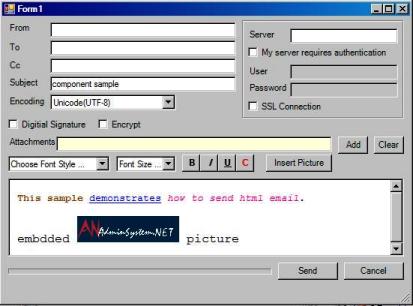Send Email with Embedded Images in Managed C++/CLI¶
In previous section, I introduced how to send email with file attachment. In this section, I will introduce how to add embedded images to email in Managed C++.
Introduction¶
To attach an embedded images to email, you should add an attachment to email at
first. Then you should assign an unique identifier(contentid) to this attachment.
Finally, you need to replace the <img src="your file name" /> to <img src="cid:yourcontentid"
/>.
Note
Remarks: All of samples in this section are based on first section: A simple Managed C++/CLI project. To compile and run the following example codes successfully, please click here to learn how to create the test project and add reference of EASendMail to your project.
[Managed C++ Example - Add embedded images to email]¶
The following example codes demonstrate how to send email with embedded images.
Note
To get the full sample projects, please refer to Samples section.
#include "stdafx.h"
using namespace System;
using namespace EASendMail;
int main(array<System::String ^> ^args)
{
try
{
SmtpMail ^oMail = gcnew SmtpMail("TryIt");
// Set sender email address, please change it to yours
oMail->From = "test@emailarchitect.net";
// Set recipient email address, please change it to yours
oMail->To = gcnew AddressCollection("support@emailarchitect.net");
// Set email subject
oMail->Subject = "test HTML email from Managed C++ with inline attachment";
// Set HTML body
oMail->HtmlBody = "<font size=5>This is</font> <font color=red><b>a test</b></font>";
// Add image attachment from local disk
Attachment ^oAttachment = oMail->AddAttachment( "d:\\test.gif" );
// Specifies the attachment as an embedded image
// contentid can be any string.
String ^contentID = "test001@host";
oAttachment->ContentID = contentID;
oMail->HtmlBody = "<html><body>this is a <img src=\"cid:"
+ contentID + "\"> embedded picture.</body></html>";
// Your SMTP server address
SmtpServer ^oServer = gcnew SmtpServer("smtp.emailarchitect.net");
// User and password for ESMTP authentication.
oServer->User = "test@emailarchitect.net";
oServer->Password = "testpassword";
// Most mordern SMTP servers require SSL/TLS connection now.
// ConnectTryTLS means if server supports SSL/TLS, SSL/TLS will be used automatically.
oServer->ConnectType = SmtpConnectType::ConnectTryTLS;
// If your SMTP server uses 587 port
// oServer->Port = 587;
// If your SMTP server requires SSL/TLS connection on 25/587/465 port
// oServer->Port = 25; // 25 or 587 or 465
// oServer->ConnectType = SmtpConnectType::ConnectSSLAuto;
Console::WriteLine("start to send email with inline image...");
SmtpClient ^oSmtp = gcnew SmtpClient();
oSmtp->SendMail(oServer, oMail);
Console::WriteLine("email was sent successfully!");
}
catch (Exception ^ep)
{
Console::WriteLine("failed to send email with the following error:");
Console::WriteLine(ep->Message);
}
return 0;
}
To attach embedded images/pictures, SmtpMail.ImportHtmlBody and SmtpMail.ImportHtml methods are strongly recommended. With these methods, you don’t have to specify the ContentID manually. The html source/file html body can be imported to email with embedded pictures automatically.
You can also refer to the htmlmail.* samples in EASendMail Installer. Those samples demonstrate how to build a HTML email editor and send HTML email with attachment or embedded images/pictures.

Next Section
At next section I will introduce how to sign email with digital certificate.
Appendix
- EASendMail SMTP Component SDK
- Process Bounced Email (Non-Delivery Report) and Email Tracking
- Bulk Email Sender Guidelines
- Work with Email Queue
Comments
If you have any comments or questions about above example codes, please click here to add your comments.
